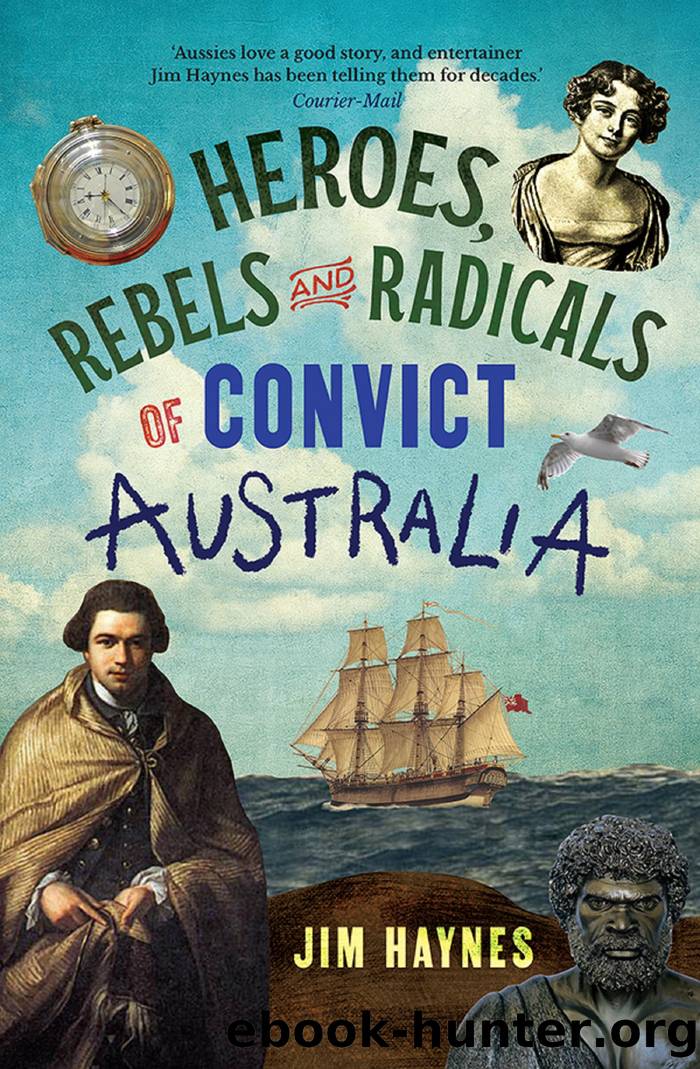Heroes, Rebels and Radicals of Convict Australia by Jim Haynes

Author:Jim Haynes [Jim Haynes]
Language: eng
Format: epub
Publisher: Allen & Unwin
Published: 2023-09-26T00:00:00+00:00
Antigua
On 25 May 1811, William Dawes, now 49 years old, married Grace Gilbert in St Pancras Old Church in London. She was a cousin of Reverend Nathaniel Gilbert, the Vicar of Bledlow, whom Dawes had met in Sierra Leone and worked with at Bledlow. Grace, orphaned in infancy, had been raised by her aunt Mary Horne whose son, Reverend Melvill Horne, an Anglican minister sympathetic to Methodism, had been briefly in Sierra Leone with Dawes in 1792. The Gilbert family had been in Antigua as planters for a number of generations.
Dawes joined the committee of the Church Missionary Society in May 1812 and resigned a year later, notifying the committee that he was leaving to live with his wifeâs family in Antigua, in the Caribbean. He offered to represent the interests of the society on the island. So, after Dawes, his second wife and his eighteen-year-old daughter moved to Antigua, in 1813, the Church Missionary Society and Foreign Bible Society conferred and offered Dawes the position of âSuperintendent and Catechist of the English Harbour Schoolsâ at a salary adequate âto make up his present means of livingâ.
Dawes also acted as agent for the son of his friend and cousin-in-law Reverend Gilbert, and looked after his affairs that related to the Gilbert properties and plantations. Williamâs wife, Grace, also received a small annuity from the Gilbert family trust and Dawes was also still entitled to a half-pay pension for his service in the marines. For some reason, the paymaster neglected to pay this for ten years but it was restored in 1821, with a substantial amount of backpay.
Although Nathaniel Gilbert was an ordained minister of the established Church of England, most of the Gilbert family in Antigua were Methodists and this was to cause much angst and conflict of interest for William Dawes as he attempted to manage and staff the missionary schools for the children of slaves and ex-slaves in Antigua. The Church Missionary Society was funded and run by the Anglican church and their doctrine was in conflict with that of the Methodists. For a while the schools expanded and Dawes was able to use Methodists and lay people as teachers. Finding good teachers was still difficult and six had to be sacked on the grounds of âfornication and adulteryâ.
On the other hand, Dawes reported on the part the schools played in saving the female children of slave women, whose fathers were estate managers and overseers. Dawes reported that many of these girls made successful Christian marriages. In the end it was church politics and doctrinal disagreements that brought the whole enterprise undone, rather than sin.
In 1819 the Church Missionary Society made Dawes superintendent of their societyâs schools throughout the West Indies. He was paid £300 per year and travelling expenses. But the travel exhausted him and his unbending diligence and obsessive work ethic took a toll, along with bouts of fever and rheumatism. In letters home he expressed sorrow that the death of a grandchild âso operated on my mind ⦠that I cannot write more at presentâ.
Download
This site does not store any files on its server. We only index and link to content provided by other sites. Please contact the content providers to delete copyright contents if any and email us, we'll remove relevant links or contents immediately.
The Vikings: Conquering England, France, and Ireland by Wernick Robert(81283)
Ali Pasha, Lion of Ioannina by Eugenia Russell & Eugenia Russell(40237)
The Conquerors (The Winning of America Series Book 3) by Eckert Allan W(37379)
The Vikings: Discoverers of a New World by Wernick Robert(36964)
Cecilia; Or, Memoirs of an Heiress — Volume 1 by Fanny Burney(32538)
Cecilia; Or, Memoirs of an Heiress — Volume 2 by Fanny Burney(31934)
Cecilia; Or, Memoirs of an Heiress — Volume 3 by Fanny Burney(31925)
Empire of the Sikhs by Patwant Singh(23069)
The Secret History by Donna Tartt(19025)
Hans Sturm: A Soldier's Odyssey on the Eastern Front by Gordon Williamson(18564)
Cat's cradle by Kurt Vonnegut(15324)
Pimp by Iceberg Slim(14476)
Sapiens: A Brief History of Humankind by Yuval Noah Harari(14358)
Talking to Strangers by Malcolm Gladwell(13340)
Norse Mythology by Gaiman Neil(13332)
Leonardo da Vinci by Walter Isaacson(13305)
4 3 2 1: A Novel by Paul Auster(12363)
Underground: A Human History of the Worlds Beneath Our Feet by Will Hunt(12081)
The Radium Girls by Kate Moore(12012)
